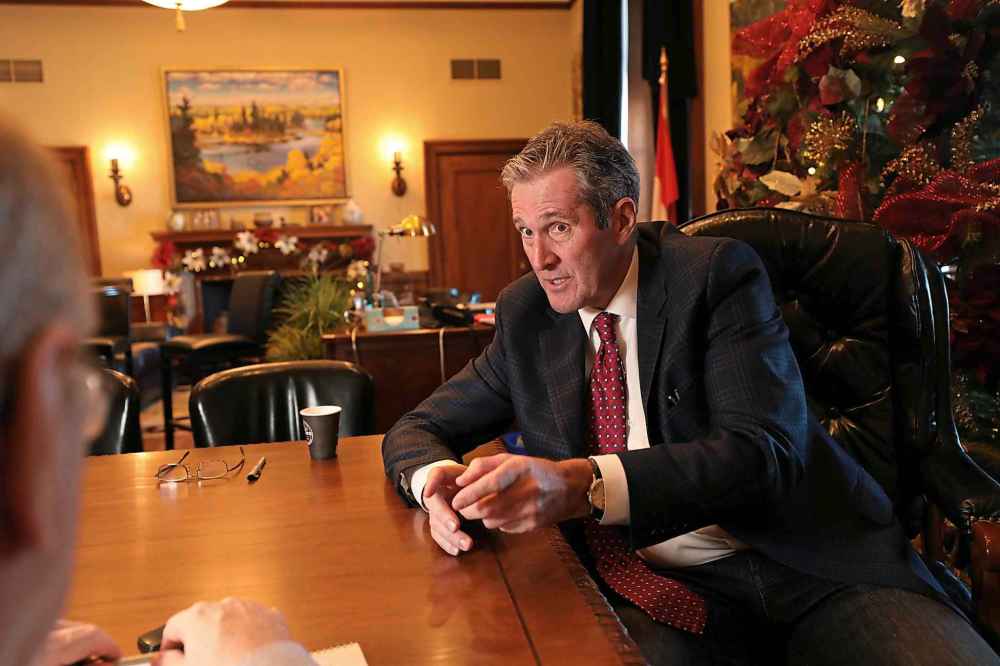Solving meth crisis not Manitoba’s only priority, Pallister says
Advertisement
Read this article for free:
or
Already have an account? Log in here »
To continue reading, please subscribe:
Monthly Digital Subscription
$0 for the first 4 weeks*
- Enjoy unlimited reading on winnipegfreepress.com
- Read the E-Edition, our digital replica newspaper
- Access News Break, our award-winning app
- Play interactive puzzles
*No charge for 4 weeks then price increases to the regular rate of $19.00 plus GST every four weeks. Offer available to new and qualified returning subscribers only. Cancel any time.
Monthly Digital Subscription
$4.75/week*
- Enjoy unlimited reading on winnipegfreepress.com
- Read the E-Edition, our digital replica newspaper
- Access News Break, our award-winning app
- Play interactive puzzles
*Billed as $19 plus GST every four weeks. Cancel any time.
To continue reading, please subscribe:
Add Free Press access to your Brandon Sun subscription for only an additional
$1 for the first 4 weeks*
*Your next subscription payment will increase by $1.00 and you will be charged $16.99 plus GST for four weeks. After four weeks, your payment will increase to $23.99 plus GST every four weeks.
Read unlimited articles for free today:
or
Already have an account? Log in here »
Hey there, time traveller!
This article was published 18/12/2018 (2549 days ago), so information in it may no longer be current.
Brian Pallister rejects the notion that his government’s response to the meth crisis will define his premiership.
In a year-end interview, Pallister said his administration is working to fix the province’s finances while instituting major reforms in health, the justice system and, soon, in education.
“What I cannot ever do as premier, and what our government cannot do, is forget that there are a lot of other people in the province that have other priorities at the same time that may not involve meth,” he said.

Pallister noted that while crystal meth is now considered the No. 1 illicit drug problem in Manitoba, it wasn’t too long ago that fentanyl was viewed as the main scourge.
“People wanted to call it a crisis. Now they don’t call fentanyl a crisis, they call something else a crisis,” he said.
The Progressive Conservative government has faced a barrage of criticism from Opposition MLAs for not responding quickly and forcefully enough to the methamphetamine problem.
While it has announced some initiatives — including walk-in clinics for adults with addictions, a joint program with Ottawa that will boost assistance for addicts going through withdrawal, and equipping paramedics with an anti-psychotic drug they can administer to potentially violent users — many feel it has not been enough.
A Winnipeg Regional Health Authority briefing note on meth, brought to the public’s attention recently by the NDP, said a “lack of provincial leadership” has hampered the city’s ability to cope with the problem.
“We’ve taken numerous steps already, and there’s more to do,” the premier said, adding that “this is not an issue that government solves by itself.”
Asked if the meth problem has made him feel less safe, Pallister said: “It concerns me if it concerns Manitobans, and I know it concerns Manitobans. I’ve had too many meetings and discussions with people to believe otherwise. But it’s not just meth. And it’s not just solutions like (that which) are being proposed by other political organizations, like safe-injection sites (something the PC government has rejected so far). There’s not an instant answer.”
Pallister said public-safety perceptions surrounding meth can potentially affect business. “You’ve got people who’ve invested their life savings in a small business, say, in the core. and if people aren’t going down there because they’re afraid, that’s having a devastating effect on that family or that small business, too.”
The premier made an allegation, first raised by his health minister in an interview with the Free Press, that the “rapidity in the legalization of cannabis” in Canada has played a role in fuelling the meth problem.
“People are choosing (meth) because it’s so cheap. It’s been made available cheaply by the same people who were previously engaged in selling cannabis (before legalization),” he said, citing conversations he’s had with the RCMP and Mayor Brian Bowman on the issue.
“Maybe just stopping meth dealers isn’t the answer because that then just means they’re just selling something else. Stopping the flow of meth isn’t by itself going to address the issue. It’s the seller,” he said. “We can’t just focus totally on the unfortunate situation of a meth addict.”
Might fully addressing the mushrooming methamphetamine problem tax the government’s resources as it labours to balance the budget?
“Well, it has already. And it is right now. And it will more,” he said.
Meanwhile, Pallister dismissed the view expressed in a recent Free Press editorial that meth is the “defining issue” of his career.
“I would say I seriously doubt that,” he said.
larry.kusch@freepress.mb.ca

Our newsroom depends on a growing audience of readers to power our journalism. If you are not a paid reader, please consider becoming a subscriber.
Our newsroom depends on its audience of readers to power our journalism. Thank you for your support.



